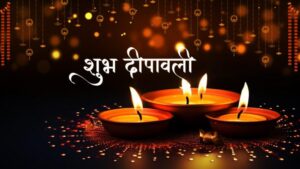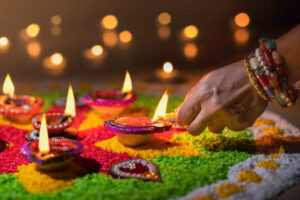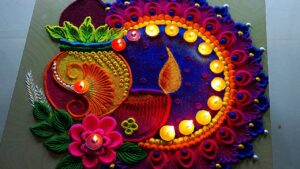Diwali, also known as the Festival of Lights, is one of the biggest and most celebrated festivals in India. This beautiful festival is observed with joy, light, and colors, symbolizing the victory of good over evil and light over darkness. People clean their homes, decorate them with lights, perform the laxmi Pooja and exchange gifts with family and friends. But over the years, the celebration has also led to significant pollution, prompting many to adopt a more eco-friendly way to celebrate.
This article will provide all the important details about Diwali, including the date and time for 2024, the significance of the festival, and how to celebrate a pollution-free Diwali. Let’s dive in!
When is Diwali in 2024?
In 2024, Diwali will be celebrated on Friday, November 1. The date of Diwali varies every year because it is based on the Hindu lunar calendar. Diwali always falls on the Amavasya (new moon) of the Kartik month, which usually occurs in October or November.
Diwali is a five-day festival, with the main celebration falling on the third day. Here is a quick look at the five-day Diwali celebrations in 2024:
- Day 1 – Dhanteras (October 30, 2024): This day marks the beginning of the festival, where people buy gold, silver, or new utensils as a symbol of good luck and prosperity. It is also the day to honor Dhanvantari, the god of health and healing.
- Day 2 – Naraka Chaturdashi or Choti Diwali (October 31, 2024):
Known as Choti Diwali, it symbolizes the victory of Lord Krishna over the demon Narakasura. It is the day for cleaning homes and preparing for the main Diwali celebrations. - Day 3 – Lakshmi Puja (November 1, 2024):
The main day of Diwali is dedicated to Goddess Lakshmi, the goddess of wealth and prosperity. Families perform Lakshmi Puja, light diyas, and burst firecrackers (in many regions) to celebrate the occasion. - Day 4 – Govardhan Puja (November 2, 2024):
On this day, people worship Lord Krishna, who is believed to have lifted the Govardhan Hill to protect the people of Vrindavan from torrential rains. - Day 5 – Bhai Dooj (November 3, 2024):
Bhai Dooj is a celebration of the bond between brothers and sisters. Sisters perform aarti for their brothers and pray for their long life and happiness, while brothers offer gifts in return.
Dewali 2024: Why is Diwali Celebrated?
Diwali is a festival rich in traditions and stories. The main reason for celebrating Diwali differs across various regions of India, but the common theme is the victory of light over darkness and the triumph of good over evil. Let’s explore the key reasons why Diwali is celebrated:
- Return of Lord Rama to Ayodhya:
In northern India, Diwali marks the return of Lord Rama to his kingdom Ayodhya after 14 years of exile. According to the Hindu epic Ramayana, Lord Rama defeated the demon king Ravana and returned home with his wife Sita and brother Lakshmana. To celebrate his return, the people of Ayodhya lit thousands of oil lamps, symbolizing the removal of darkness and the welcoming of light. - Goddess Lakshmi’s Blessings:
Diwali is also the day to honor Goddess Lakshmi, the goddess of wealth, prosperity, and happiness. It is believed that Lakshmi visits homes on Diwali night to bless people with good fortune. Families clean and decorate their homes to welcome her and perform Lakshmi Puja to seek her blessings for a prosperous future. - Victory of Lord Krishna:
In some regions, particularly in South India, Diwali is celebrated to mark Lord Krishna’s victory over the demon Narakasura. This day is known as Naraka Chaturdashi and symbolizes the destruction of evil forces. - Sikh Celebration – Bandi Chhor Divas:
For the Sikh community, Diwali coincides with Bandi Chhor Divas, the day when Guru Hargobind Ji, the sixth Sikh Guru, was released from imprisonment by the Mughal emperor. Sikhs light up the Golden Temple in Amritsar to celebrate this event. - Jain Festival:
In Jainism, Diwali marks the day when Lord Mahavira, the 24th Tirthankara, attained nirvana (liberation) on Diwali night.
Dewali 2024: Traditional Diwali Celebrations
The celebration of Diwali is filled with colorful rituals, festive meals, and family gatherings. Here are some common traditions people follow during Diwali:
- Lighting Diyas and Candles:
The lighting of diyas (oil lamps) is one of the most important aspects of Diwali. People decorate their homes and surroundings with diyas, candles, and string lights to drive away darkness and welcome the blessings of Goddess Lakshmi.

- Rangoli Designs:
Many households create rangoli outside their doorways using colored powders, rice, flowers, or natural dyes. These intricate designs are believed to welcome guests and gods into the home.

- Fireworks:
Bursting firecrackers has been a longstanding tradition during Diwali, as it is believed that the loud sounds drive away evil spirits. However, this practice has increasingly become a matter of concern due to its contribution to air and noise pollution.

- Exchanging Sweets and Gifts:
Diwali is a time to strengthen bonds with loved ones. Families exchange sweets, gifts, and tokens of love, spreading happiness and prosperity. Traditional sweets like laddoos, jalebi, and gulab jamun are a big part of the celebration.

Diwali 2024: How to Celebrate a Pollution-Free Diwali
In recent years, the conversation around a pollution-free Diwali has gained importance. With growing awareness about the environmental and health impacts of firecrackers, more people are choosing to celebrate Diwali in an eco-friendly manner. Here are some tips for a pollution-free and sustainable Diwali:
- Avoid Firecrackers:
Firecrackers release harmful chemicals into the air, causing a spike in air pollution and respiratory problems, especially in children and the elderly. Instead of bursting crackers, consider celebrating with family and friends by lighting diyas, candles, and string lights. You can also enjoy fireworks displays organized by local authorities in a controlled and safe manner. - Use Natural Decorations:
Swap plastic or synthetic decorations with eco-friendly and natural alternatives. You can use flowers, organic materials, or paper-based decorations to brighten your home without harming the environment. Create rangoli with natural dyes or flowers to avoid the chemicals found in synthetic colors. - Opt for Energy-Efficient Lighting:
Use LED lights instead of traditional bulbs. LEDs are more energy-efficient, durable, and help reduce electricity consumption during the festival. - Give Eco-Friendly Gifts:
Avoid giving gifts wrapped in plastic or with excessive packaging. Opt for eco-friendly gifts like plants, handmade items, or reusable products. You can also gift things like bamboo products or jute bags that are environmentally friendly. - Say No to Plastic:
Reduce plastic waste during Diwali by avoiding plastic decorations, utensils, and packaging. Instead, use biodegradable plates, cups, and utensils for serving sweets and snacks. - Donate to Charity:
Spread the joy of Diwali by helping those in need. Donating clothes, food, or money to the less fortunate adds a greater purpose to your celebration and helps others experience the joy of Diwali.
Conclusion
Diwali is a festival of light, joy, and new beginnings. While the traditional celebrations remain cherished, it is crucial to adapt to more environmentally conscious practices for the well-being of the planet and future generations. By celebrating a pollution-free Diwali, we ensure that the festival remains beautiful, safe, and meaningful for everyone. Let’s welcome the light and prosperity of Diwali in a way that preserves our environment and promotes sustainability.
Happy Diwali! Let’s spread light, not pollution!
Join our telegram channel |
Study Haunt Telegram Channel |
Join our whatsapp channel |
Study Haunt Whatsapp Channel |
